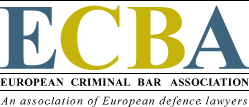The European Arrest Warrant (EAW) is frequently described as a proof of the success of mutual recognition. Nonetheless it is also often described as a victim of its own success. The EAW has operated a radical change in extradition proceedings within the EU, in particular by reducing cases of refusal of extradition and by radically speeding up the surrender procedures. This has led Member States’ authorities to use this instrument more thatn any other mutual coopearation instruments, even in cases where other instruments would be sufficient to guarantee the efficiency of criminal proceedings and would constitute a much less severe intrusion into the citizens’ rights.
The ECBA and many other NGO’s have been advocating for a reform of the EAW over the last years. Recently politicians and EU Institutions have also recognized the shortcomings of the system. The European Parliament (EP) has now took an innovative and decisive step in this problem area and has initiated a legislative process for the review of the EAW. MEP Baroness Sarah Ludford has been appointed Rapporteur for a European Parliament report 'Review of the European Arrest Warrant' and organized a group group hearing the 17th October 2013 in order to gather evidence and views from experts in the field. The ECBA was invited to attend and represented by Advisory Board Members Vania Costa Ramos (The link to the recording of the hearing can be found here and the Library summary of the event here).
After the hearing MEP Baroness Sarah Ludford has drafted a legislative own-initiative draft report for the EP with recommendations to the Commission on the review of the European Arrest Warrant.
Baroness Ludford’s Report proposes that the EP requests the Commission to submit, on the basis of Article 82 TFUE legislative providing for:
- a mandatory refusal ground based on the infringement or risk of infringement of human rights applicable to mutual recognition instruments;
- a proportionality check when issuing mutual recognition decisions, based on the seriousness of the offence and the availability of an appropriate less intrusive alternative measure;
- a standardised consultation procedure whereby the relevant authorities in the issuing and executing state can exchange information regarding the execution of judicial decisions, for example in regard to the EAW to ascertain trial-readiness;
- a procedure whereby a mutual recognition measure can, if necessary, be validated in the issuing State by a judge, court, investigating magistrate or public prosecutor, in order to overcome the differing interpretations of the term “judicial authority”;
- consistent legal remedies to secure the right to an effective legal remedy in compliance with Article 47(1) of the Charter of Fundamental Rights of the European Union;
It also proposes the EP to call:
- for a regular review of non-executed EAWs and consideration of whether they, together with the corresponding SIS and Interpol alerts, should be withdrawn; also calls for the withdrawal of EAWs and the corresponding SIS and Interpol alerts where the EAW has been refused on mandatory grounds;
- on Member States to implement the whole body of Union criminal justice measures and thereby make available to judicial authorities alternative and less intrusive mutual recognition instruments ;
- for Member States to compensate damage arising from miscarriages of justice relating to mutual recognition instruments, in accordance with the standards laid down in the ECHR and in the well-established case-law of the ECJ;
- on Member States and the Commission to cooperate in strengthening contact networks of judges, prosecutors and criminal defence lawyers to facilitate effective and well-informed EAW proceedings, and to offer relevant training at national and European level to judicial and legal practitioners including defence lawyers acting in such proceedings.
- on the Commission to provide adequate funding to bodies such as the European Judicial Training Network, to the potential European Arrest Warrant Judicial Network and to a network of defence lawyers working on European criminal justice and extradition matters.
- on the Commission to explore the legal and financial means available at Union level to improve detention conditions in Member States.
Please click here for the draft report and here for the amendments.
